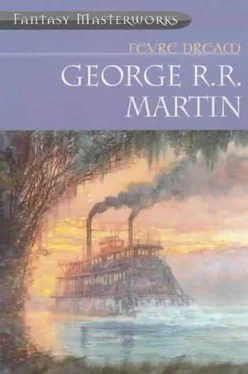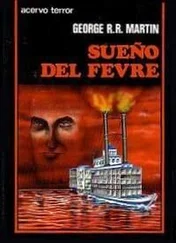George Martin - Fevre Dream
Здесь есть возможность читать онлайн «George Martin - Fevre Dream» весь текст электронной книги совершенно бесплатно (целиком полную версию без сокращений). В некоторых случаях можно слушать аудио, скачать через торрент в формате fb2 и присутствует краткое содержание. Жанр: Фэнтези, на английском языке. Описание произведения, (предисловие) а так же отзывы посетителей доступны на портале библиотеки ЛибКат.
- Название:Fevre Dream
- Автор:
- Жанр:
- Год:неизвестен
- ISBN:нет данных
- Рейтинг книги:4 / 5. Голосов: 1
-
Избранное:Добавить в избранное
- Отзывы:
-
Ваша оценка:
- 80
- 1
- 2
- 3
- 4
- 5
Fevre Dream: краткое содержание, описание и аннотация
Предлагаем к чтению аннотацию, описание, краткое содержание или предисловие (зависит от того, что написал сам автор книги «Fevre Dream»). Если вы не нашли необходимую информацию о книге — напишите в комментариях, мы постараемся отыскать её.
Fevre Dream — читать онлайн бесплатно полную книгу (весь текст) целиком
Ниже представлен текст книги, разбитый по страницам. Система сохранения места последней прочитанной страницы, позволяет с удобством читать онлайн бесплатно книгу «Fevre Dream», без необходимости каждый раз заново искать на чём Вы остановились. Поставьте закладку, и сможете в любой момент перейти на страницу, на которой закончили чтение.
Интервал:
Закладка:
Framm stared at him accusingly. “I’m not licensed for the Missouri.”
“I know. I’m lettin’ you go. You deserve a better boat than the Reynolds anyway.”
Karl Framm sucked on his pipe and said nothing. Marsh could not look him in the eye. He shuffled some papers. “I’ll pay you all the wages due you,” he said.
Framm nodded and turned to go. At the door he stopped. “If I get a berth,” he said, “I’ll keep lookin’. If I find her, you’ll hear.”
“You won’t find her,” Marsh said bluntly. Then Framm closed the door and walked off his steamer and out of his life, and Abner Marsh was as alone as he had ever been. Now there was nobody left but him, nobody who remembered the Fevre Dream or Joshua’s white suit or the hell that beckoned behind Damon Julian’s eyes. Now it only lived because Marsh remembered, and Marsh was aiming to forget.
The years passed.
The Eli Reynolds made money in the Missouri trade. For almost a year she ran there, and Marsh captained her and sweated with her and tended to his freight and his passengers and his ledger books. He made enough in his first two trips to pay off three-quarters of his considerable debts. He might have grown rich, had not events in the larger world conspired against him: Lincoln’s election (Marsh voted for him, despite the fact that he was a Republican), the secession, the firing on Fort Sumter. Marsh thought of Joshua York’s words as the carnage approached: the red thirst is on this nation, and only blood will sate it.
It took a great deal of blood, Marsh reflected afterward, bitterly. He seldom spoke about the war, or his experiences in it, and had little patience with those who fought the battles over and over again. “There was a war,” he would say loudly. “We won. Now it’s done with, and I don’t see why we got to yammer about it endlessly, like it was something to be proud of. Only good thing come out of it was endin’ slavery. The rest I got no use for. Shooting a man ain’t nothin’ to build a brag on, goddammit.” Marsh and the Eli Reynolds returned to the upper Mississippi during the early years of the fighting, bringing troops down from St. Paul and Wisconsin and Iowa. Later on, he served on a Union gunboat, and saw action in a couple of river battles.
Karl Framm fought on the river, too. Marsh heard that he died in the fighting at Vicksburg, but he never knew for sure.
When peace came, Marsh returned to St. Louis, and took the Eli Reynolds into the upper Mississippi trade. He formed a brief association with the owner/captains of four rival boats, setting up a packet line with regular schedules to compete more effectively with the larger companies that ruled the upper river. But they were all strong-willed, stubborn men, and after a half year of quarrels and bluster the company was dissolved. By that time Abner Marsh found he had no appetite for the steamboat business anymore. The river had changed, somehow. After the war, there didn’t seem to be a third as many steamers as there had been before it, yet the competition was fiercer, since the railroads were taking up more and more of the trade. Now when you steamed into St. Louis, you found maybe a dozen steamers along the levee, where once they had been crammed in for more than a mile. There were other changes as well, in those years following the war. Coal began to crowd out wood just about everywhere except on the wilder reaches of the Missouri. Federal regulators moved in with rules and laws that had to be followed, safety checks and registers and all manner of stuff, and even tried to prohibit racing. The steamboatmen changed too. Most of the men Marsh had known were dead or retired now, and those who took their places were strangers with strange ways. The old boisterous, cussing, free-spending, wild riverman who slapped you on the back, bought you drinks all night, and told you outrageous lies was a dying breed now. Even Natchez-under-the-hill was only a ghost of its former self, Marsh heard, nearly as sedate as the city on top of the hill with all its proper mansions with their fancy names.
One night in May of 1868, more than ten years after he had last seen Joshua York and the Fevre Dream, Abner Marsh took a walk along the levee. He thought back on the night when he and Joshua had first met, and walked along this same landing-the steamers had been crowded in then, great proud big side-wheelers and tough little stern-wheelers, old boats and new ones, and the Eclipse had been there among them, tied up to her wharfboat. Now the Eclipse had become a wharfboat herself, and there were boys on this river who called themselves strikers and mud-clerks and cub pilots who had never laid eyes on her. And the landing was nearly empty. Marsh stood and counted. Five boats. Six, if you counted the Eli Reynolds. The Reynolds was so old now that Marsh was half-afraid to take her out on the river. She must be the oldest damn steamboat in the world, he thought, with the oldest captain, and him and her were both just as tired.
The Great Republic was taking on freight. She was a huge new side-wheeler that had come out of some Pittsburgh boatyard the year before. They said she was 335 feet long, which made her the biggest steamer on the river now that the Eclipse and the Fevre Dream were both gone and forgotten. She was grand, too. Marsh had looked her over a dozen times, and gone aboard her once. Her pilot house was surrounded with all kinds of fancy trim and had an ornate cupola on top of it, and the paintings and glass and polished wood and carpets inside her were enough to break your heart. She was supposed to be the finest, prettiest steamboat ever built, luxurious enough to put all the older boats to shame. But she wasn’t especially fast, Marsh had heard, and she was said to be losing money at a frightening rate. He stood with his arms folded against his chest, looking gruff and stern in his severe black coat, and he watched the roustabouts load her up. The rousters were black, every man among them. That was another change. All the roustabouts on the river were blacks now. The immigrants who’d worked as rousters and stokers and deckers before the war were gone, Marsh didn’t know where, and the freedmen had taken their places.
As they worked, the rousters sung. Their song was a low, melancholy chant. The night is dark, the day is long, it went. And we are far from home. Weep, my brothers, weep. Marsh knew the chant. There was another verse, one that went, The night is past, the long day done, And we are going home. Shout, my brothers, shout. But they were not singing that verse. Not tonight, here on the empty steamer landing, loading up a boat that was spanking new and plush as any but still couldn’t get enough trade. Watching them, listening, it seemed to Abner Marsh as if the whole river was dying, and him with it. He had seen enough dark nights and long days for the rest of his time on earth, and he was no longer certain he even had a home.
Abner Marsh walked slowly away from the landing back to his hotel. The next day he discharged his officers and crew, dissolved Fevre River Packets, and put the Eli Reynolds up for sale.
Marsh took what money he had, left St. Louis entirely, and bought a small house in his old hometown, Galena, within sight of the river. Only it wasn’t the Fevre River any more. They’d gone and changed it to the Galena River, years ago, and now everyone was calling it that. The new name had better associations, folks said. Abner Marsh went on calling it the Fevre, like it was called when he was a boy.
He didn’t do much in Galena. He read a lot of newspapers. That had gotten to be a habit with him, during the years he was searching for Joshua, and he liked to keep up with the fast boats and their times. There were still a few of them. The Robert E. Lee had come out of New Albany in 1866, and was a real heller. The Wild Bob Lee, some rivermen called her, or just the Bad Bob. And Cap’n Tom Leathers, as tough and mean and cussed a riverman as ever captained a steamer, had launched a new Natchez in 1869, the sixth of that name. Leathers named all his steamboats Natchez. The new Natchez was faster than any of the earlier ones, according to the papers. She cut through the water like a knife, and Leathers was bragging all up and down the river how he was going to show up Cap’n John Cannon and his Wild Bob Lee. The newspapers were full of it. He could smell a race coming on even clear up in Illinois, and it sounded like one they’d talk about for years. “I’d like to see that goddamned race,” he said to the woman he’d hired to clean house for him one day. “Neither of ’em would have a chance against the Eclipse, though, you got my word on that.”
Читать дальшеИнтервал:
Закладка:
Похожие книги на «Fevre Dream»
Представляем Вашему вниманию похожие книги на «Fevre Dream» списком для выбора. Мы отобрали схожую по названию и смыслу литературу в надежде предоставить читателям больше вариантов отыскать новые, интересные, ещё непрочитанные произведения.
Обсуждение, отзывы о книге «Fevre Dream» и просто собственные мнения читателей. Оставьте ваши комментарии, напишите, что Вы думаете о произведении, его смысле или главных героях. Укажите что конкретно понравилось, а что нет, и почему Вы так считаете.












